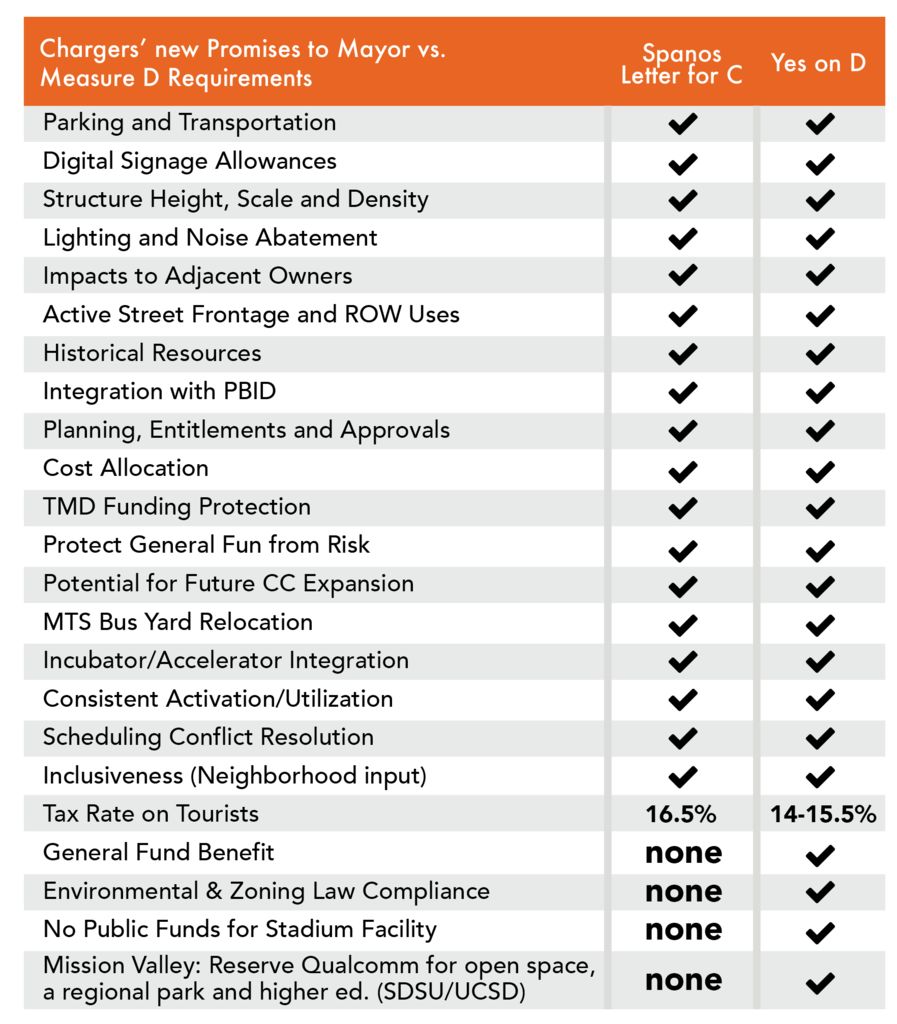5 High-Profile City Ballot Measures

Most of the Measures on this year’s San Diego City ballot are non-controversial. Measures E through I and Measure M were all placed on the ballot by the City Council and involve everything from a Charter amendment to reforming the process for removal of public officials to an increase in capacity for subsidized affordable housing.
The five measures that have attracted attention in this “year of the lengthy ballot,” are the Chargers’ Initiative (Measure C), the Citizens’ Tourism Initiative (Measure D), two Election Reform proposals (Measures K & L), and a Marijuana tax and regulation plan (Measure N).
Measures K and L sparked controversy at the City Council when proposed by the Independent Voter Project a (co publishers of IVN.us), the labor community and Alliance San Diego. Councilman Chris Cate objected to what he viewed as a rush to the ballot and both measures were qualified on one-vote margins.
Measure K would conform the City of San Diego to state law by requiring candidates to face a November runoff even if they get more than 50 percent of the low turnout primary vote. Measure L would simply conform city law to state law by putting all initiatives on the November ballot when the most people vote.
At a recent Voice of San Diego debate Measure K got all of the attention. Supporters emphasized that the current City of San Diego rules, unlike the rules for state and federal offices, allow candidates to be elected in primaries that can have as little as 20% of voters turn out. Opponents stressed their support for a more comprehensive change known as “ranked choice,” and reiterated the claim that there should have been more study.
In the most recent primary election, the Mayor, Chris Ward, and Scott Sherman were all elected without having to face the higher turnout November electorate. Barbara Bry fell just short of 50%, but her opponent, Ray Ellis, dropped out following the election. There is no mechanism to remove his name from the ballot.
According to city records, there is no official opposition to K or L despite stated opposition by the Republican Party and the largely developer- funded Lincoln Club. Supporters include the Democratic Party, San Diego Firefighters, Councilmember Todd Gloria and Council President Sherri Lightner.
Interestingly, despite the insider interest in all five ballot measures, only the Chargers’ Initiative has attracted a formal opposition committee. The biggest news leading into the first week of voting was the Mayor and Downtown Partnership joined the Chargers’ cause. Their support follows the Chamber of Commerce in supporting Measure C.
This came after weeks of behind-the-scenes negotiations that produced a letter from Dean Spanos committing to a series of conditions that begin to make Measure C look more and more like Measure D.
John Kratzer of Ballpark Village (major funders of D), Charger fan groups and the Chargers themselves all support both C and D -- despite D’s prohibition against the use of taxpayer dollars for a professional stadium facility.
Fred Maas, lead Charger negotiator, told the San Diego Union-Tribune, “We have no problem with Measure D, we’ve had a collaborative relationship with Cory.” (Cory Briggs is the lead attorney for proponents)
D supporters include Donna Frye, City Councilman David Alvarez, the League of Women Voters, and the local Democratic Party. All of these individuals and groups either oppose or have no position on C.
D’s sponsor, former Councilwoman Donna Frye, says the new Spanos commitments still fall short because the Chargers’ letter is not enforceable and there has been no commitment from either the Mayor or the team about the fate of the Qualcomm Stadium site.
Measure D also became a point of contention in the June primary. City Council candidate Barbara Bry supported Measure D while her opponent, Ray Ellis, opposed Measure D. Ellis dropped out of the race although his name still appears on the November General Election ballot.
Bry touts herself as an entrepreneur, teacher, journalist, and community volunteer. As for Measure D, Bry said, “Measure D offers a vision for re-use of the Qualcomm site for university-related development and creation of a river park and trail that could transform Mission Valley.” She continued, “and it would generate at least $18 million per year for the city’s general fund that could be used to begin addressing the city’s huge backlog of neighborhood infrastructure improvements.”
Measure D includes provisions that would limit post-Charger development in Mission Valley to a regional park and transit dependent university use. It is this provision that has attracted San Diego State supporters on both the academic and athletic sides.
Last month, SDSU sent more than 18,000 email surveys to boosters soliciting opinions about a combined Aztec football/MLS professional soccer stadium that would likely seat less than 40,000 people and have a price tag of below $250 million, a far cry from the NFL’s $1.4 billion estimate.
Whether voters can untangle the overlapping issues presented by C and D is as big a question mark as whether voters have the patience to slog through the historically long November ballot. Stay tuned.
Photo Credit: Dancestroke / shutterstock.com





